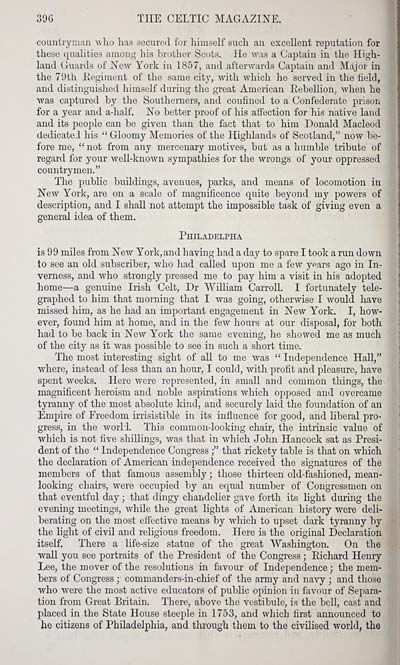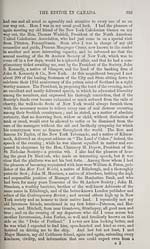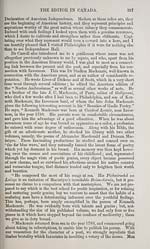Blair Collection > Celtic magazine > Volume 5
(396)
Download files
Complete book:
Individual page:
Thumbnail gallery: Grid view | List view

396 THE CELTIC MAGAZINE.
countryman -who has secured for himself such an excellent reputation for
these qualities among his brother Scots. He was a Captain in the High-
land Guards of New York in 1857, and afterwards Captain and Major in
the 79th Kegiment of the same citj', with which he served in the held,
and distinguished himself during the great American Eebellion, when he
was captured by the Southerners, and confined to a Confederate prison
for a year and a-half. No better proof of his affection for his native land
and its people can be given than the fact that to him Donald Macleod
dedicate! his " Gloomy Memories of the Highlands of Scotland," now be-
fore me, " not from any mercenary motives, but as a humble tribute of
regard for your well-known sympathies for the wrongs of your oppressed
countrymen."
The public buildings, avenues, parks, and means of locomotion in
New York, are on a scale of magnificence quite beyond my powers of
description, and I shall not attempt the impossible task of giving even a
general idea of them.
Philadelpha
is 99 miles from New York, and having had a day to spare I took a run down
to see an old subscriber, who had called upon me a few years ago in In-
verness, and who strongly pressed me to pay him a visit in his adopted
home — a genuine Irish Celt, Dr William CarroU. I fortunately tele-
graphed to him that morning that I was going, otherwise I would have
missed him, as he had an important engagement in New York. I, how-
ever, found him at home, and in the few hours at our disposal, for both
had to be back in New York the same evening, he showed me as much
of the city as it was possible to see in such a short time.
The most interesting sight of all to me w^as " Independence Hall,"
where, instead of less than an hour, I could, with profit and pleasure, have
spent weeks. Here were represented, in small and common things, the
magnificent heroism and noble aspirations which opposed and overcame
tyranny of the most absolute kind, and securely laid the foundation of an
Empire of Freedom irrisistible in its influence for good, and liberal pro-
gress, in the world. This common-looking chair, the intrinsic value of
which is not five shillings, was that in which John Hancock sat as Presi-
dent of the " Independence Congress ;" that rickety table is that on which
the declaration of American independence received the signatures of the
members of that famous assembly ; those thirteen old-fashioned, mean-
looking chairs, were occupied by an equal number of Congressmen on
that eventful day ; that dingy chandelier gave forth its light duruig the
evening meetings, Avhile the great lights of American history were deli-
berating on the most effective means by Avhich to upset dark tyranny by
the light of civil and religious freedom. Here is the original Declaration
itself. There a life-size statue of the great Washington. On the
wall you see portraits of the President of the Congress ; Eichard Henry
Lee, the mover of the resolutions in favour of Independence ; the mem-
bers of Congress ; commanders-in-chief of the army and navy ; and those
who were the most active educators of public opinion in favour of Separa-
tion from Great Britain. There, above the vestibule, is the bell, cast and
placed in the State House steeple in 1753, and which first announced to
he citizens of Philadelphia, and through them to the civilised world, the
countryman -who has secured for himself such an excellent reputation for
these qualities among his brother Scots. He was a Captain in the High-
land Guards of New York in 1857, and afterwards Captain and Major in
the 79th Kegiment of the same citj', with which he served in the held,
and distinguished himself during the great American Eebellion, when he
was captured by the Southerners, and confined to a Confederate prison
for a year and a-half. No better proof of his affection for his native land
and its people can be given than the fact that to him Donald Macleod
dedicate! his " Gloomy Memories of the Highlands of Scotland," now be-
fore me, " not from any mercenary motives, but as a humble tribute of
regard for your well-known sympathies for the wrongs of your oppressed
countrymen."
The public buildings, avenues, parks, and means of locomotion in
New York, are on a scale of magnificence quite beyond my powers of
description, and I shall not attempt the impossible task of giving even a
general idea of them.
Philadelpha
is 99 miles from New York, and having had a day to spare I took a run down
to see an old subscriber, who had called upon me a few years ago in In-
verness, and who strongly pressed me to pay him a visit in his adopted
home — a genuine Irish Celt, Dr William CarroU. I fortunately tele-
graphed to him that morning that I was going, otherwise I would have
missed him, as he had an important engagement in New York. I, how-
ever, found him at home, and in the few hours at our disposal, for both
had to be back in New York the same evening, he showed me as much
of the city as it was possible to see in such a short time.
The most interesting sight of all to me w^as " Independence Hall,"
where, instead of less than an hour, I could, with profit and pleasure, have
spent weeks. Here were represented, in small and common things, the
magnificent heroism and noble aspirations which opposed and overcame
tyranny of the most absolute kind, and securely laid the foundation of an
Empire of Freedom irrisistible in its influence for good, and liberal pro-
gress, in the world. This common-looking chair, the intrinsic value of
which is not five shillings, was that in which John Hancock sat as Presi-
dent of the " Independence Congress ;" that rickety table is that on which
the declaration of American independence received the signatures of the
members of that famous assembly ; those thirteen old-fashioned, mean-
looking chairs, were occupied by an equal number of Congressmen on
that eventful day ; that dingy chandelier gave forth its light duruig the
evening meetings, Avhile the great lights of American history were deli-
berating on the most effective means by Avhich to upset dark tyranny by
the light of civil and religious freedom. Here is the original Declaration
itself. There a life-size statue of the great Washington. On the
wall you see portraits of the President of the Congress ; Eichard Henry
Lee, the mover of the resolutions in favour of Independence ; the mem-
bers of Congress ; commanders-in-chief of the army and navy ; and those
who were the most active educators of public opinion in favour of Separa-
tion from Great Britain. There, above the vestibule, is the bell, cast and
placed in the State House steeple in 1753, and which first announced to
he citizens of Philadelphia, and through them to the civilised world, the
Set display mode to: Large image | Transcription
Images and transcriptions on this page, including medium image downloads, may be used under the Creative Commons Attribution 4.0 International Licence unless otherwise stated. ![]()
| Early Gaelic Book Collections > Blair Collection > Celtic magazine > Volume 5 > (396) |
|---|
| Permanent URL | https://digital.nls.uk/76453408 |
|---|
| Description | Volume V, 1880. |
|---|---|
| Shelfmark | Blair.6 |
| Attribution and copyright: |
|
| Description | A selection of books from a collection of more than 500 titles, mostly on religious and literary topics. Also includes some material dealing with other Celtic languages and societies. Collection created towards the end of the 19th century by Lady Evelyn Stewart Murray. |
|---|
| Description | Selected items from five 'Special and Named Printed Collections'. Includes books in Gaelic and other Celtic languages, works about the Gaels, their languages, literature, culture and history. |
|---|

